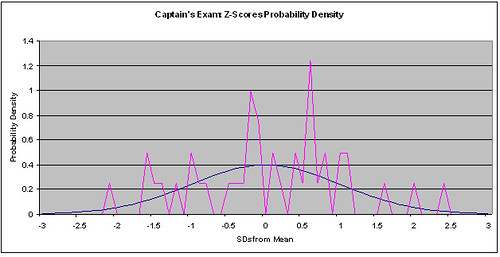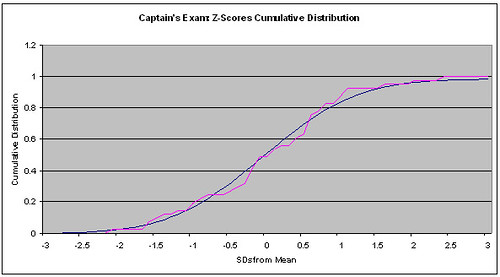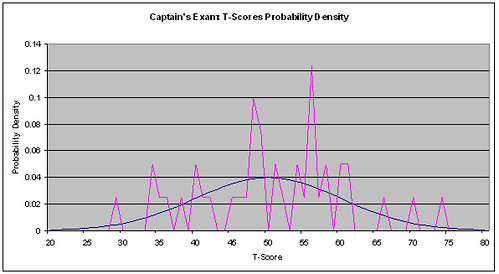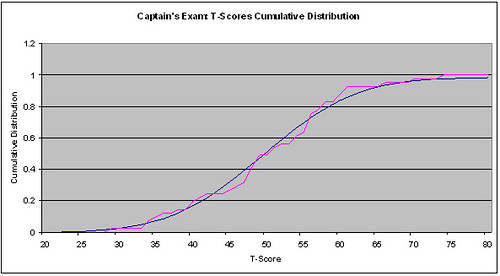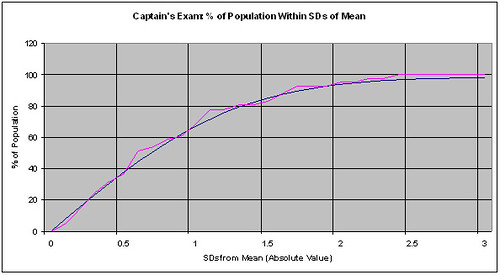I don't know how many times I have to say it. We. Don't. Know. You don't know, and I don't know. What I do know, is that you make it sound like all the white people did really well, while all the black people failed miserably.
Well, then, you need to read more clearly, because I have said nothing of the kind, nor have I implied anything of the kind. Again, your focus on race is interfering with your ability to actually read what is written. Stop projecting your own issues onto what is being said. And just because you don't know doesn't mean that no one else knows. Additionally, if you don't know, then you cannot, in any way, tell me that what I have stated is not true. If you don't know what didn't cause the disparity, then you don't know what did cause the disparity. So, it would appear that you have no more argument.
That is not the case. There were many fewer black people to begin with, and their results were spread over a range of scores. There were more white people who did poorly, but nobody is saying that the test discriminated against them. The fact is, there just happened to be a number of positions available, and none of the black firefighters would have received those promotions. What if there had been more positions? Do you think that there would be the same issue if even one black firefighter had been in a position to be promoted? No, it was one specific case of a certain number of positions, and the specific individuals who did the best that day happened to not be black.
You cannot say that. You have already stated that you don't know what caused the disparities, and now you are offering an explanation for the disparities. The laws of probability completely refute your attempt at an explanation, so it could be easily refuted anyway. But the fact is, you said you don't know. Which means that you cannot offer an explanation. Nor can you refute any other explanation.
The test is not the foundation of the white firefighters' lawsuit at all. It is the foundation of the city's defense. The test can very easily be removed from the equation, since the test should not be on trial. The city has managed to twist the case so that it is no longer about their actions, but about the test, which is not the important factor here. I have said it before, but I'll say it again: if the test is wrong, then throw it out, set it on fire, whatever you want. Nothing about the test will justify the city's decisions.
Wait a minute. Do you even think about what you are writing? If the test is not an important foundation of the lawsuit, what exactly are the white firefighters suing for? They are suing because scores were thrown out. Without the test there are no scores. So, an invalid test that creates unfair promotion practices is perfectly fine. The city should have just gone ahead and used that which was found to be invalid because just because a test is found to be biased is no reason not to use it and to make decisions based on innacurrate scores? 
 Your arguments are getting more and more ridiculous. The city DID throw out the test.
Your arguments are getting more and more ridiculous. The city DID throw out the test.
Based on my "minority status", I certainly hope the courts throw out the case. People try all the time to say that gay people want "extra rights", and the reason they say that is because some people do try to get "extra rights". This is one of those cases. The city wants to say that discrimination only counts when it's against black people. That is not true, it is a right that everyone should have to be safe from discrimination.
Sure. That's why you argue for gay marraige, right? Here you demand equal opportunity in that arena for your minority status, but argue against equal opportunity in the test and assessment arena for people just because their skin is a darker color. What a hypocritical position to take.:roll:
Since neither of us were there, why don't we again agree that neither one of us can be concretely right or wrong. But you should look at the site that DD posted. Here's a quote from the New Haven's Corporation Counsel, Thomas Ude, who raised the issue of throwing out the results, “federal law does not require that you [the CSB] make a finding that this test . . . was not job-related, which is another way of saying it wasn’t fair. A test can be job-related and have a disparate impact on an ethnic group and still be
rejected because there are less discriminatory alternatives for
the selection process.” To me, that sounds like the validity of the test was not at all the main concern.
That is in reference to only one type of validity, and also, that action is what is specifically prohibited under Title VII. Did you bother to look up the case setting legal precedent I referred you to earlier? And the test is an issue simply because it was the criterion used. You conveniently ignore the fact that had it not been for the test being used as the criterion, there would not be a lawsuit because there would be no scores to have been thrown out. However, the legal expert is saying exactly the same thing I am saying. This instrument produced a disparate effect. That means it is not a fair way of deciding promotions.
They didn't, they fell into a range with the majority of the white participants. And we don't also don't know how the "experts" know anything. We don't know what they considered, or if they separately tested any of the men to determine their actual level of knowledge and qualification.
No, they did not. Evidently, they are called experts for a reason. Because they possess the knowledge and experience to confer expertise. Even if you knew what they considered, chances are you would not understand the implications of what they considered. That is evidenced by many of your arguments. The reason that you do not consider certain issues to be of value in the decision is, quite simply, because you do not have the expertise to understand the implications. Perhaps if you had this expertise, you could fund your chemistry education by testifying as an expert witness in the area of testing and assessment. But, then, there is also a very good reason why you do not fund your chemistry education in that way. You don't have the expertise necessary.
If you want them answered so badly, you can certainly take the time to find them. If you can't, then just say so. I have posted the same questions over and over again when I ask you to answer them. Again, if you won't even back up your own statements, then just don't make them.
And you have yet to answer any of the numerous questions you have been asked. You simply side step them. Again, If I am wrong, as you say, and this test contained no bias and was completely valid for the purpose for which it was intended, explain why the minority scores were significantly lower and grouped by minority status? You keep wanting to tell me I'm wrong, but you have yet to come up with an explanation of why I am wrong. So, don't say "I don't know" because that means you don't know that I am wrong, either. Give me your explanation. If this test was a valid and reliable instrument, and contained no bias, why did the scores not fall on a normal curve? Laws of probability say they will, given all things equal. They did not. You explain it.
A response which does not actually address the issue, or answer the question, or offer any examples of where they are different or similar. Maybe you just want to talk about critical thinking skills, instead of using any...
It would be nice if you could discuss them, and/or use them.
No, my point was that I could easily go get a job right now and have enough qualification to be "professional", but am instead choosing to expand my current knowledge. And I am putting my knowledge into practice by working independently on a project that I designed. Do I have an advisor? Yes. So what. Many "professional" also collaborate and co-author papers. I'll be sure to let the scientific community at large know that apparently they are not "professionals".
Most professionals collaborate with other professionals, and with equal status. The fact that it is necessary for you to have an advisor means that you have not reached that status as of yet. If you had, you wouldn't need the supervision of an advisor. The scientific community is comprised of professionals. However, you are a student studying to become a part of that professional community. Oh, you failed to note what journal you were published in, and what article it was. Another question unanswered.
And let me say it again, this is not a discussion about testing and assessment. You keep trying to make it one because you feel that then you can simply tell everyone else they don't know anything, but it still doesn't make it the issue. The test is still not the issue, but I'll say it as many times as I have to before you are capable of understanding that.
Ahh, the test is an issue. Without the test, there would have been no scores to throw out, and the city would not have to justify its actions, nor would the white firefighters have a lawsuit.
No, the validity of the test has no bearing on the "appearance" of only promoting white firefighters.
There was no "appearance" to it. It didn't "appear" that way. It was that way.

Again, if you would like to provide evidence, then that would be fine. Otherwise, unless you are secretly in contact with the group analyzing the test, we don't know what they are considering or how they have reached any of their conclusions.
I have a much better idea of what is considered in regard to this situation than do you. I have already posted, in a reply to DD, I believe it was, exactly what is considered in determining the various types of validity on a testing instrument. And you really need to stop using "we" when you are referring to yourself. Don't assume because you don't know something, no one knows it.
If you have trouble understanding a simple concept, that really makes me worry about how you assess testing materials. You can't "norm" something based on one single factor that can be affected by a multitude of other things which you are conveniently ignoring. Race does not imply anything about their knowledge or qualification.
When you learn anything at all about what you are attempting to discuss, then we will discuss norm referencing. Your statements indicate that you have no idea what you are talking about. I'll stick to what I am qualified for, and you stick to your periodic tables.
Exactly, they didn't. And this decision should be based on what they "did" do, which was discriminatory. I'm glad we agree.
How exactly was throwing out the test scores discriminatory? You are still failing to explain that.
Nope, not focused on race at all.
Completely focused on race. It is evidenced throughout your posts.
I have explained this many times. My explanation favors the fact that each man is responsible for making himself qualified, and you have absolutely no idea which men did so.



